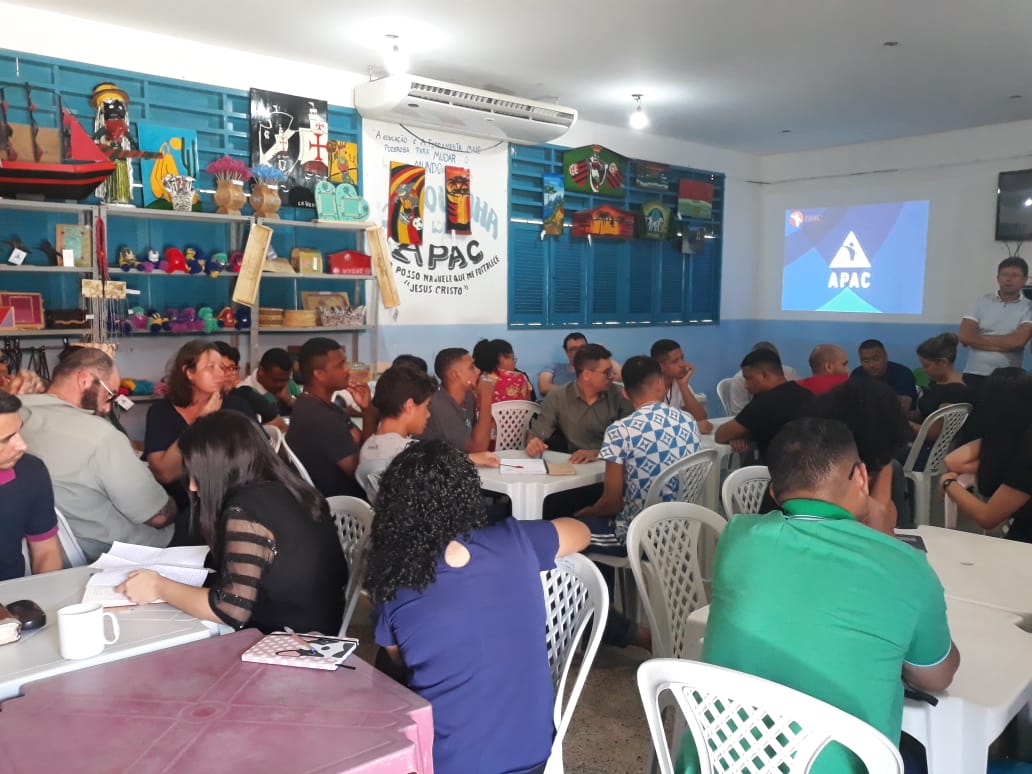
In this blog post we hear from Sacha Darke, a senior lecturer at University of Westminster, who recently travelled to South America to visit existing and developing higher education prison initiatives.
A prisoner-led approach to criminology
Over the past few years, Andy Aresti and I have developed four Convict Criminology (CC) prison education initiatives in the UK with our third year BA Criminology students. CC is an international ex-prisoner-led movement that aims to develop collaborative research activism between universities and prisoners, and to support serving and former prisoners through higher education and into academic and criminal justice positions.
Prisoners’ perspectives are largely absent from criminology texts and penal policy
Our work starts with the observation that prisoners’ perspectives are largely absent from criminology texts and penal policy, and that the prison system needs to be radically reformed, if not abolished. We coordinate an academic mentoring scheme in which criminology lecturers are matched with prisoners studying for social science degrees, and three initiatives in closed prisons in which ‘inside’ and ‘outside’ learners jointly study and publish criminology papers. Classes are co-delivered by former prisoners. Courses are taught at levels 3 (HMP Pentonville), 6 (HMP Grendon) and 7 (HMP Coldingley).
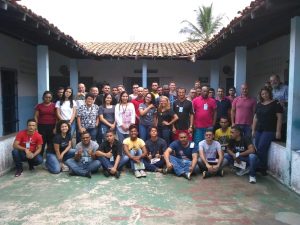
Of course, prisoners engaged with critical criminologists long before the recent wave of prison-university – or our preferred term, prisoner-university – partnerships in the UK. This includes South America, where I have researched since 2010. In 2016 I led two sessions on a course delivered at an open women’s prison, Penitenciária Feminina do Butantã, by master’s degree students involved in University of São Paulo’s (USP) Criminal Sciences Research and Extension Programme Centre (CPECC).
Another Vision – university and prison students learning together
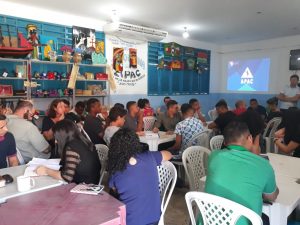 In July and August 2019, Andy and I took a 10,000km tour of Brazil and Argentina to visit a number of existing and developing higher education prison initiatives. Our first stop was Maranhão State University (UEM), on the northern coast of Brazil, where we joined anthropologist Karina Biondi in delivering pilot lessons on Another Vision, a project she had adapted from our level 3 model for use on the closed unit of APAC de São Luis. Another Vision was fully implemented in September. Classes are designed and co-delivered by Francisco Magalhães, who previously spent five years in custody on remand.
In July and August 2019, Andy and I took a 10,000km tour of Brazil and Argentina to visit a number of existing and developing higher education prison initiatives. Our first stop was Maranhão State University (UEM), on the northern coast of Brazil, where we joined anthropologist Karina Biondi in delivering pilot lessons on Another Vision, a project she had adapted from our level 3 model for use on the closed unit of APAC de São Luis. Another Vision was fully implemented in September. Classes are designed and co-delivered by Francisco Magalhães, who previously spent five years in custody on remand.
Similar to our Pentonville project, the outside learners mentor, as well as study, alongside the inside learners, few of whom completed school, as is the reality across the country’s prison system. The project will conclude its first year with the publishing of an edited book of prisoner ethnographic writings. I returned to participate in the project in October and will do so again in April. Maranhão State prison authorities have invited Biondi to expand Another Vision to two more prisons.
Bringing the outside world in
Our next stop was the town of Porto Velho, in the western Amazonian state of Rondônia, to spend time at a day 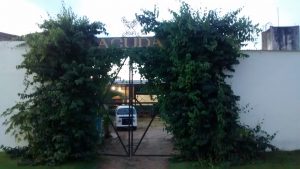 centre for serving prisoners run by another ex-prisoner-led voluntary sector NGO, ACUDA. Prisoners that attend the centre are currently building a residential centre on the site, which they aim to move into by the end of 2020. ACUDA considers itself to be an abolitionist, research-activist organisation. It has gained permission from judicial authorities for those studying in higher education at the new centre to be given supervised internet access, once a contract for distance learning has been agreed with a local university. This will be a Brazilian first.
centre for serving prisoners run by another ex-prisoner-led voluntary sector NGO, ACUDA. Prisoners that attend the centre are currently building a residential centre on the site, which they aim to move into by the end of 2020. ACUDA considers itself to be an abolitionist, research-activist organisation. It has gained permission from judicial authorities for those studying in higher education at the new centre to be given supervised internet access, once a contract for distance learning has been agreed with a local university. This will be a Brazilian first.
GDUCC places particular attention on the societal benefits of bringing the outside world into prison.
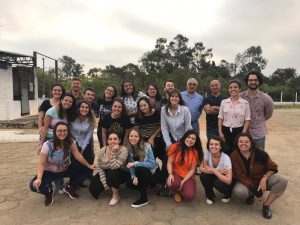 Our final stop in Brazil was USP in the southern state of São Paulo, where we spent two days with the University-Prison-Community Dialogue Group (GDUCC), a second research activist group based in the same department as CPECC. GDUCC started in 2006 and to date has implemented courses in ten prisons across five states, including Penitenciária José Parada Neto, a closed prison we visited in July, and an open prison unit in Centro de Detenção Provisória da Capital Chácara Belém II, which I visited in October. Similar to our Pentonville initiative and UEMA’s Other Vision project, GDUCC’s inside and outside learners study social sciences, including psychology and criminology, at foundation level. GDUCC places particular attention on the societal benefits of bringing the outside world into prison. Neither the inside nor outside students need to be university students.
Our final stop in Brazil was USP in the southern state of São Paulo, where we spent two days with the University-Prison-Community Dialogue Group (GDUCC), a second research activist group based in the same department as CPECC. GDUCC started in 2006 and to date has implemented courses in ten prisons across five states, including Penitenciária José Parada Neto, a closed prison we visited in July, and an open prison unit in Centro de Detenção Provisória da Capital Chácara Belém II, which I visited in October. Similar to our Pentonville initiative and UEMA’s Other Vision project, GDUCC’s inside and outside learners study social sciences, including psychology and criminology, at foundation level. GDUCC places particular attention on the societal benefits of bringing the outside world into prison. Neither the inside nor outside students need to be university students.
Face-to-face degrees and guard-free university centres
Not only is UBA distinct in taking full face-to-face-taught degrees into prison, but guards were banned from both of the university centres we visited
The final leg took us to the Argentinean universities of Buenos Aires (UBA) and the Littoral (UNL), and to two of 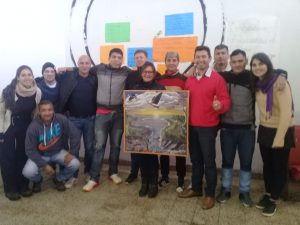 dozens of prison-based university centres set up across the country since the 1980s. UBA currently teaches six undergraduate degrees, including Law, Sociology and Psychology, in five closed prisons, including Cárcel de Devoto, where we spent a morning with the representatives of approximately 150 current university students. UNL teaches in three closed prisons, including Cárcel las Flores, which we also visited a few days later. Around 60 students are currently enrolled.
dozens of prison-based university centres set up across the country since the 1980s. UBA currently teaches six undergraduate degrees, including Law, Sociology and Psychology, in five closed prisons, including Cárcel de Devoto, where we spent a morning with the representatives of approximately 150 current university students. UNL teaches in three closed prisons, including Cárcel las Flores, which we also visited a few days later. Around 60 students are currently enrolled.
Not only is UBA distinct in taking full face-to-face-taught degrees into prison, but guards were banned from both of the university centres we visited. The centre at Cárcel las Flores had several computers connected to the Internet to enable UNL to provide on-line distance learning. Outside learners from the two universities take only occasional seminars with the inside learners on their courses. However, the two groups of students regularly come together at the prisons for extra-curricular activities.
This is part of the Prison University partnerships blog series, which shines a spotlight each month on an example of prisons and universities working in partnership to deliver education. If you would like to respond to the points and issues raised in this blog, or to contribute to the blog yourself, please contact Helena.